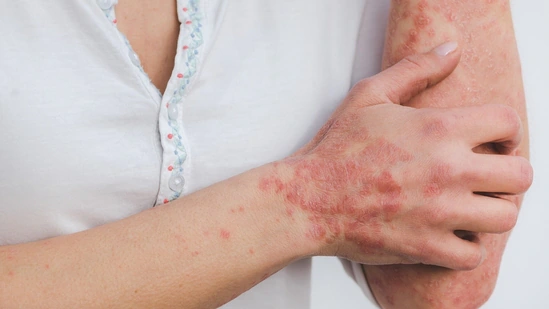PSORIASIS
- Home
- PSORIASIS
Psoriasis Treatment in Guntur | Best Dermatologist
At Leelavati Skin and Laser Hospital, we provide the best Psoriasis Treatment in Guntur, understanding the physical and emotional toll that psoriasis can take on your life. Our team of experienced dermatologists and cutting-edge technology make us your trusted partner in the fight against this challenging skin condition.
Psoriasis can be a lifelong struggle, but it doesn’t have to be hopeless. at Leelavati Advanced Skin Hospital Guntur, Our specialized treatments are tailored to your unique needs, focusing on symptom relief and long-term management. We combine the latest advancements in medical science with a compassionate approach to ensure you receive the best care possible.
Best Treatment for Psoriasis in Guntur | Psoriasis Specialist Near Me
If you’re seeking effective and advanced Psoriasis treatment in Guntur, look no further than Leelavati Skin and Laser Hospital. Our experienced dermatologists and state-of-the-art facilities ensure that you receive the best treatment available. Psoriasis can be a persistent skin condition, but with our specialized approach, you can regain clear and healthy skin.
Our treatment plans are tailored to your unique needs, employing cutting-edge techniques and technologies, such as laser therapy and biologics.We prioritize not only the elimination of visible symptoms but also long-term management and patient education to prevent relapses. Your journey to healthier skin begins with a consultation, where we assess your condition and discuss your personalized treatment plan.

Psoriasis Treatment in Guntur | Best Treatment for Psoriasis
APPOINTMENT
What is Psoriasis?
Psoriasis is a chronic skin disease characterized by accelerated life cycles of skin cells that cause it to build up on the surface very rapidly. All this buildup of cells forms thick, red patches with silvery scales that may be itching and at times painful. Psoriasis is an autoimmune disease wherein the body’s immune system mistakenly attacks the cells of healthy skin and thus produces inflammation along with rapid skin cell production.
These manifestations of psoriasis include a wide array of forms, with the most common form being plaque psoriasis. While it can develop anywhere, it particularly affects the scalp, elbows, knees, and lower back. Psoriasis can also vary in severity from small patches to large widespread areas., resulting in thick, red, and scaly patches on the skin’s surface. This autoimmune disorder can be uncomfortable and often leads to physical and emotional distress for those who suffer from it.
What is the Main Cause of Psoriasis?
The main cause of psoriasis is an overactive immune system. In those with the malady, the immune system mistakenly attacks the normal skin cells as if they were dangerous invaders. The reaction from the immune cells promotes inflammation and leads to accelerating the process of producing skin cells. Where the skin cells take a few weeks to grow and fall off, in a person with psoriasis, this can take just a few days. Characteristic patches thick and scaling on the skin are the results of a rapid build-up of cells.
It is believed that genetics and environmental factors cause it, though the exact cause of psoriasis is not well known. Many people who suffer from psoriasis are likely to have the disease history within their families. Some of the main triggers include stress, infections, skin injuries, smoking, and a few medications that are likely responsible for flare-ups of the disease.
What are the Symptoms of Psoriasis?
The symptoms of psoriasis can vary depending on the type and severity of the condition. Common symptoms include:
Red Patches of Skin: These patches are often covered with thick, silvery-white scales. They can appear anywhere on the body but are most commonly found on the scalp, elbows, knees, and lower back.
Dry, Cracked Skin: The skin may become dry and cracked, sometimes leading to bleeding.
Itching and Burning: The affected areas can be intensely itchy, and some people may experience a burning or stinging sensation.
Thickened or Ridged Nails: Psoriasis can also affect the nails, causing them to become thick, pitted, or ridged. In severe cases, nails may separate from the nail bed.
Joint Pain and Swelling: In some cases, psoriasis can lead to psoriatic arthritis, which causes joint pain, stiffness, and swelling.
The severity of symptoms can range from mild to severe, with some people experiencing only small patches of dry skin, while others may have widespread, painful areas of thick, scaly skin. Flare-ups can come and go, often triggered by stress, infections, or other factors.
What is the Best Treatment for Psoriasis in Guntur?
The treatment for psoriasis aims to manage symptoms, reduce inflammation, and improve skin appearance. Common treatments include:
1. Topical Treatments: Medications applied directly to the skin, such as corticosteroids, vitamin D analogs, tar preparations, and calcineurin inhibitors, to reduce inflammation and slow skin cell growth.
2. Phototherapy: Exposure to ultraviolet (UV) light under medical supervision can help reduce symptoms by slowing down the overactive skin cells.
3. Systemic Medications: Oral or injectable medications that work throughout the body to control severe psoriasis. These may include methotrexate, cyclosporine, and biologics, which target specific parts of the immune system.
4. Lifestyle and Home Remedies: Moisturizers, avoiding triggers (like stress and certain foods), and maintaining a healthy lifestyle can help manage symptoms.
5. Alternative Therapies: Some individuals find relief with acupuncture, herbal treatments, or other complementary therapies.
Consulting with a dermatologist is crucial for a personalized treatment plan tailored to the type and severity of psoriasis.
The Best Dermatologist in Guntur
In Guntur, Leelavathi Advanced Skin & Laser Centre stands out as the premier destination for psoriasis treatment. This renowned skin care clinic boasts a team of highly skilled and experienced dermatologists who are dedicated to providing the best dermatological care in Guntur.
Best Treatment For Psoriasis
The clinic offers state-of-the-art treatments and personalized care plans to manage psoriasis effectively. Patients can benefit from a range of therapies that include topical treatments, phototherapy, and advanced biologic medications to control psoriasis symptoms.
Prevention Strategies
Preventing psoriasis flare-ups and managing the condition involves a holistic approach. Patients can benefit from lifestyle modifications such as maintaining a healthy diet, managing stress levels, and avoiding triggers like smoking and excessive alcohol consumption.
Skincare and Moisturizing
Regular skin care routines and moisturizing can also help in managing the symptoms of psoriasis.
Psoriasis is a challenging skin condition that requires specialized care and management. We’ve known for having the best dermatologist, and offer cutting-edge psoriasis treatment in Guntur, ensuring that patients receive the most effective and compassionate care possible. If you or a loved one is struggling with psoriasis, consider reaching out to Leelavathi Advanced Skin & Laser Centre for expert guidance and relief from this chronic skin condition.
Most Frequently Asked Questions on Psoriasis Treatment in Guntur
1. What are the major goals of psoriasis treatment?
The major goals of treatment are to decrease the inflammation, slow down the excessive skin cell growth, relieve itch and discomfort, and make the skin look better.
2. How long does it take before the results of psoriasis treatments appear?
The results vary according to the type of psoriasis, its severity, and the treatment applied. Some may see improvement in a few weeks, though others take time up to several months to show marked changes.
3. What is the efficacy of topical treatments for all types of psoriasis?
Topical treatments often are effective for mild or even moderate disease, but not for severe forms of the disease. In these latter states, treatments such as systemic or phototherapy may be required.
4. Is it possible to control the symptoms of psoriasis by making lifestyle changes?
Yes, various lifestyle changes like reducing stress, eating healthily, avoiding known triggers such as tobacco smoking and excessive intake of alcohol, and keeping the body well-hydrated improve symptoms and conditions of the skin.
5. What is phototherapy, and how does it work?
Phototherapy is a psoriasis treatment where a doctor or nurse gives your skin exposure to ultraviolet rays. It can help reduce swelling and decrease skin cell production.
6. Do treatments for psoriasis have side effects?
Yes, different treatments have different side effects. Common ones include skin irritation/thinning with topicals, nausea/liver issues due to systemic medications, and increased light sensitivity with phototherapy.
7. How do biologic medications work for psoriasis?
Biologics are a class of drugs that target specific parts of the immune system to decrease inflammation and reduce the turnover of skin cells. It is often prescribed for moderate to serious psoriasis that has not responded to other forms of treatment.
8. Is there a cure for psoriasis?
Presently, there is no cure for psoriasis, but the different kinds of treatments are quite effective to keep symptoms under control and improve quality of life. Researchers study the condition to develop better therapies and, hopefully, a future cure.
In conclusion, while there is no cure for psoriasis, the Best Treatment for Psoriasis in Guntur offers effective solutions to manage symptoms and improve quality of life. Additionally, addressing other skin concerns such as dull skin treatment and best pimple treatment with specialized treatments can enhance overall skin health and appearance. By consulting with experts and utilizing advanced therapies, you can achieve clearer, healthier skin and find comprehensive care for all your skincare needs.
Check out our Facebook, & Instagram pages to learn more about our treatments.
